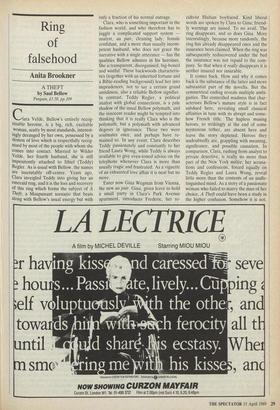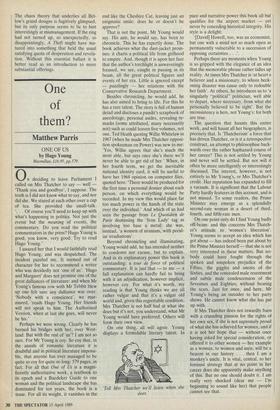Ring of falsehood
Anita Brookner A THEFT
by Saul Bellow
Penguin, f3.50, pp.109
Clara Velde, Bellow's entirely recog- nisable heroine, is a big, rich, excitable woman, scatty by most standards, interest- ingly deranged by her own, possessed by a demon of love which is respectfully recog- nised by most of the people with whom she comes into contact. Married to Wilder Velde, her fourth husband, she is still Impenitently attached to Ithiel (Teddy) Regler. As is usual with Bellow, the names are inscrutably off-centre. Years ago, Clara inveigled Teddy into giving her an emerald ring, and it is the loss and recovery of this ring which forms the subject of A Theft, a Maupassant scenario that beats along with Bellow's usual energy but with
only a fraction of his normal outrage.
Clara, who is something important in the fashion world, and who therefore has to juggle a complicated support system analyst, au pair, cleaning lady, female confidant, and a more than usually incom- petent husband, who does not grace the narrative with a single utterance — has the qualities Bellow admires in his heroines. She is transparent, disorganised, big-boned and wistful. These backwoods characteris- tics (together with an inherited fortune and a Bible-reading background) lead her into imprudences, not to say a certain grand untidiness, also a reliable Bellow signifier. In contrast, Teddy Regler, a political analyst with global connections, is a pale shadow of the usual Bellow polymath, and the innocent reader might be tempted into thinking that it is really Clara who is the polymath, but a polymath with advanced degrees in ignorance. These two were soulmates once, and perhaps have re- mained so. In any event, Clara describes Teddy passionately and constantly to her friend Laura Wong, while Teddy is always available to give even-toned advice on the telephone whenever Clara is more than usually tragic and frustrated. As a vignette of an exhausted love affair it is neat but no more.
Enter now Gina Wegman from Vienna, the new au pair. Gina, given leave to hold a small party in Clara's Park Avenue apartment, introduces Frederic, her re- cidivist Haitian boyfriend. Kind liberal words are spoken by Clara to Gina; friend- ly warnings are issued. To no avail. The ring disappears, and so does Gina. More interestingly, because more randomly, the ring has already disappeared once and the insurance been claimed. When the ring was subsequently rediscovered under the bed the insurance was not repaid to the com- pany. So that when it really disappears it is neither insured nor insurable.
It comes back. How and why it comes back is the substance of the latter and more substantial part of the novella. But the symmetrical ending reveals multiple ambi- guities. The controlled madness that char- acterises Bellow's mature style is in fact subdued here, revealing small classical affinities in tune with its abrupt and some- how French title. The hapless musing heroes, so strikingly at the end of some mysterious tether, are absent here and leave the story depleted. Heroes they undoubtedly are, grappling with meaning, significance, and possible causation. In comparison, Clara, rushing from analyst to private detective, is really no more than part of the New York mêlée; her accusa- tions and confessions, forced equally on Teddy Regler and Laura Wong, reveal little more than the contents of an undis- tinguished mind. As a story of a passionate woman who failed to marry the man of her choice, A Theft could have been a study in the higher confusion. Somehow it is not. The chaos theory that underlies all Bel- low's grand designs is fugitively glimpsed, but its only purpose seems to be to hint interestingly at mismanagement. If the ring had not turned up, so unexpectedly, so disappointingly, A Theft might have ma- tured into something that held the usual satisfying quota of desperation and revela- tion. Without this essential ballast it is better read as an introduction to more substantial offerings.



















































 Previous page
Previous page